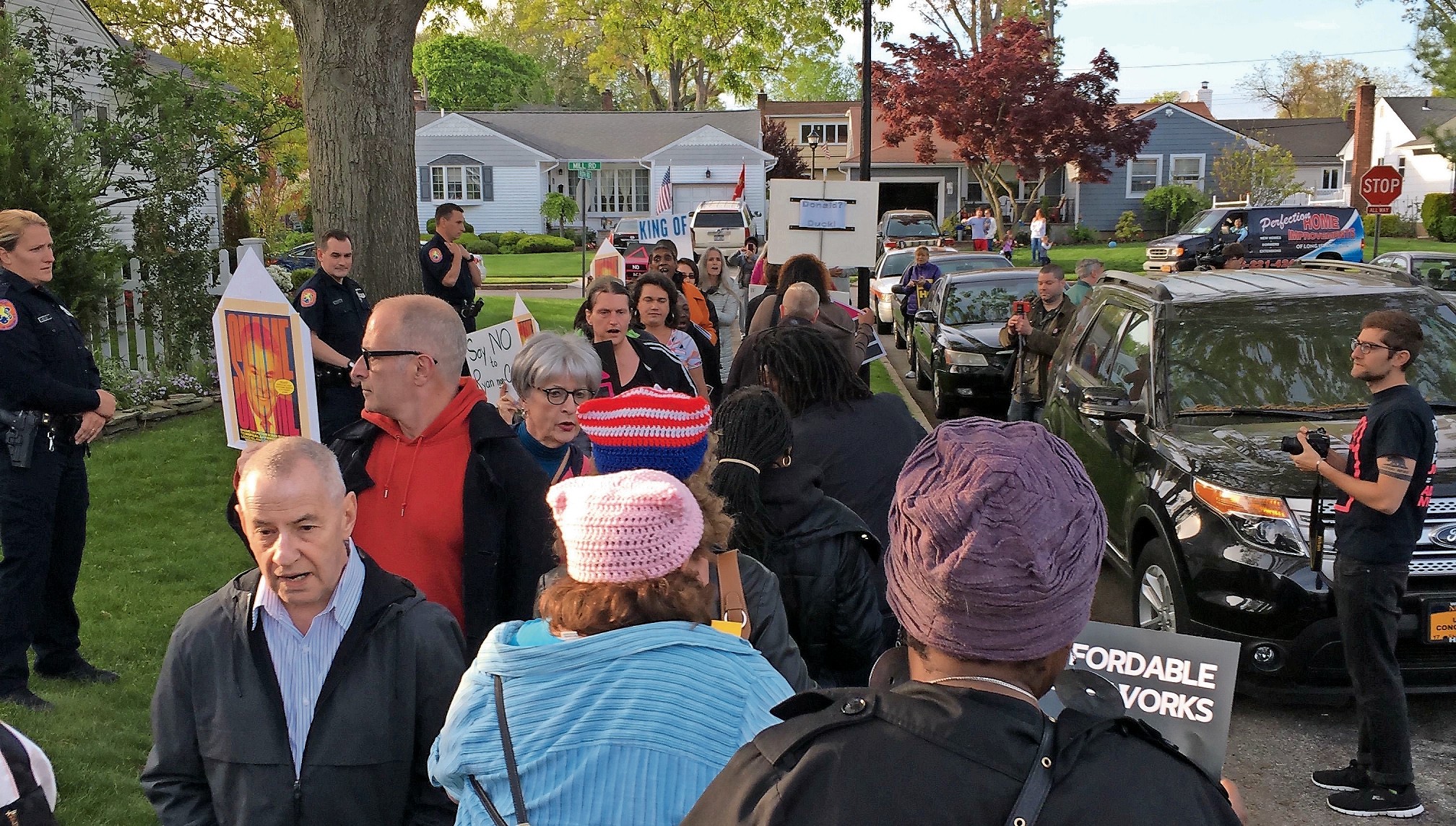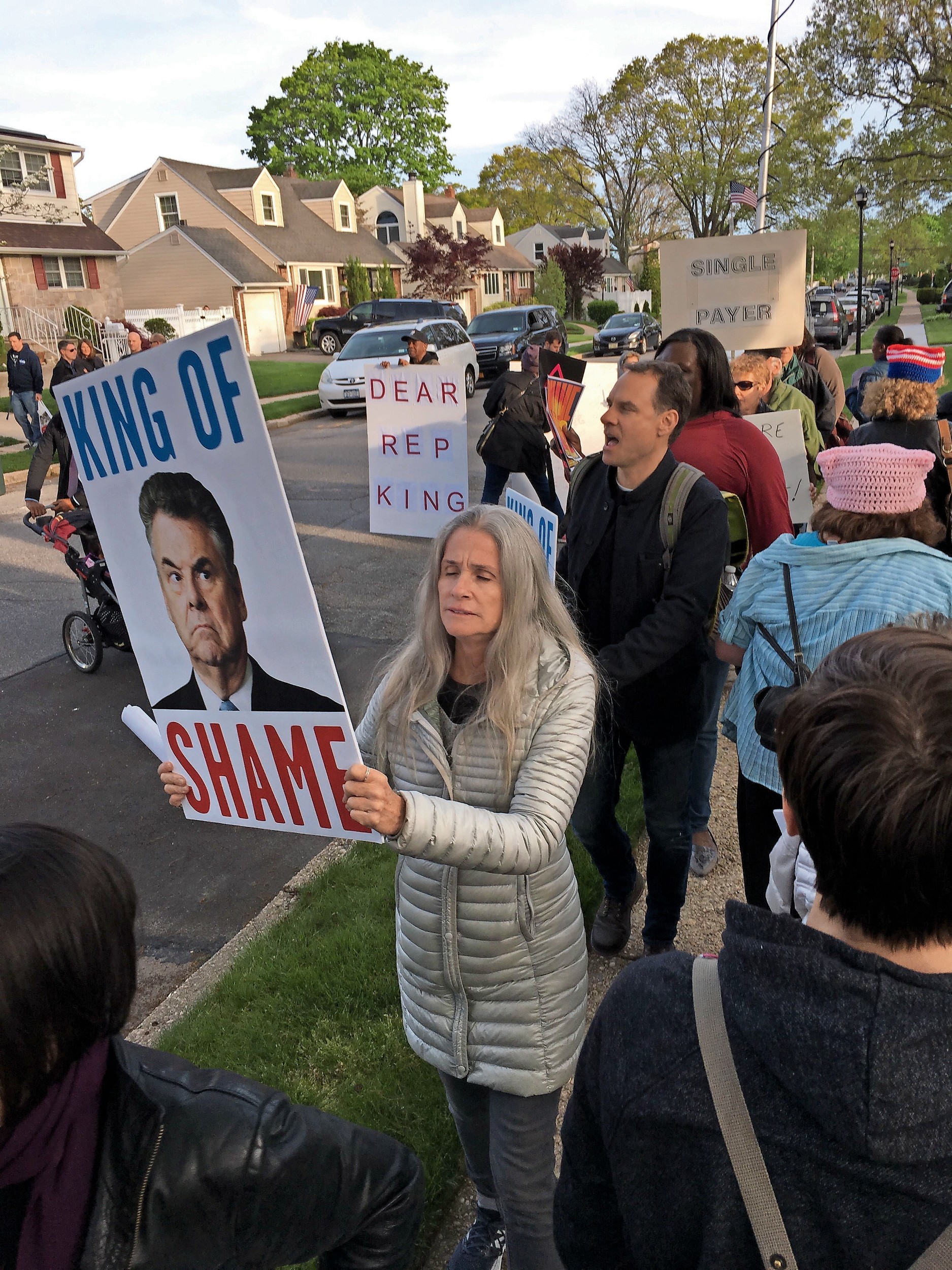Health debate intensifies
Locals, activists decry Rep. King’s AHCA vote at protest at his house

About 50 people marched up and down the sidewalk on Roth Road in Seaford on May 11, protesting outside U.S. Rep. Peter King’s home because he voted in favor of the House of Representatives’ American Health Care Act.
King, a Republican, represents the 2nd Congressional District, which includes Seaford and part of Wantagh. He supported the Republican proposal that would repeal and replace parts of the Affordable Care Act, one of President Barack Obama’s major domestic achievements.
Republicans and Democrats alike have been critical of the legislation, which passed narrowly, 217 to 213, on May 4. Several Long Island and New York City residents who took part in the protest in front of King’s home said they were concerned about several provisions of the bill, including scaling back the Medicaid program and allowing state governments to apply for a waiver that would let insurers charge higher premiums for some people with pre-existing medical conditions.
‘Life and death’
Juli Grey-Owens, a Huntington Station resident, is the executive director of the Long Island Transgender Advocacy Coalition. Members of her organization and two New York City-based groups — Housing Works, a nonprofit fighting AIDS and homelessness, and Rise & Resist, which has “a broad focus against President Donald Trump and any extreme-right efforts in his administration,” one member said — took part in the protest, along with several of King’s constituents.
The 2nd District stretches across the South Shore, from Wantagh-Seaford to Ronkonkoma. The most recent analysis from the Congressional Budget Office, released in March, suggested that 72,300 people in King’s district would lose coverage by 2026 if the AHCA became law.
Grey-Owens said that Long Islanders have had trouble reaching King because he does not want to appear at town hall events and has not been in his Massapequa Park office when protesters have gathered outside it. She explained that organizers decided to demonstrate at his home to stress how severely passage of the AHCA would affect his constituents and how outraged many of them are about the bill.
“We’re not talking about something like people arguing about changing the name of a street,” Grey-Owens said. “We’re talking about health care, which is life and death to people in the trans community and people who have HIV or AIDS and so many Americans. This is not a frivolous thing.”
Tim Murphy, a Rise & Resist organizer, said that members of his organization came to Long Island when they heard that residents and activists would be protesting outside King’s home because the repeal of the ACA would affect countless people not just in the 2nd District, but throughout New York. He described the AHCA as an “immoral case of right-wing overreach.”
“He is threatening the lives of not only about 70,000 people in his district who rely on these programs for their health, but millions more nationwide,” Murphy said of King. “He is obviously not the only Republican to have served Trump and not his own constituents by voting for this cruel and crappy bill, but we seized the opportunity to take the outrage to his home that day.”
Grey-Owens said she had spoken with several of King’s constituents at the protest and at others across the region in recent months, and noted that many people with pre-existing conditions fear they would lose coverage because they would not be able to afford it. She was alarmed that gender dysphoria or a history of sexual assault would be considered pre-existing conditions if the AHCA were law, she said.
“They will tell you, ‘Don’t worry about it, you’ll be covered because you live in New York,’” Grey-Owens said, adding that the state likely would not apply for the waiver. “You may have access, but you may not be able to afford the health care because they’ve uncapped the cost. It’s so irresponsible, and really boggles the mind.”
Lingering concerns
King said he was not home when the marchers gathered outside his house. His wife, Rosemary, sat inside and watched television while the marchers chanted.
Nassau County police officers were on hand to make sure that demonstrators, who toted colorful signs, stayed on the sidewalk and did not move into the street or onto King’s property. The protesters hoisted an oversized Mother’s Day card that Grey-Owens said was designed to highlight the negative ways in which the AHCA would impact women, including expectant mothers and transgender women.
Seaford residents looked on while the protesters marched, and King said that some of his neighbors were upset that the demonstration took place so close to their homes. He said that no one had ever held a protest outside his house, and he called the decision to do so disgraceful.
“No matter what the issue is, to demonstrate outside someone’s house … it’s really low-life,” King said. “If people on the right were doing this at a Democrat’s house, I would feel the same way.”
At a teleconferenced town hall in March, King acknowledged that the ACA had expanded Medicaid to thousands of low-income residents in his district. He said he opposed the original Republican replacement plan, which would have “knocked them off right away.” In a telephone interview on May 12, King said that he had lingering concerns about cuts to the program.
“We are protecting everyone on [the ACA] now and everyone who will go on it for next three years,” King said. “That was a step in the right direction. The main thing I’m concerned about now is keeping Medicaid funding at the proper level, and I’m reaching out to different members of the Senate to make sure that that happens.”
King described the AHCA as a work in progress. Senate Majority Leader Mitch McConnell created a 13-man working group on health care, and King said he had called Republican Sens. John McCain, Dean Heller, Rob Portman and Susan Collins, who co-sponsored her own version of an ACA replacement bill called the Patient Freedom Act, about his concerns.
Ultimately, King said, he voted for the AHCA because it would take away mandates, eliminate a tax on medical devices, attempt to clean up fraud and give people “a sense of independence.” However, he criticized his House colleagues who celebrated the passage of their version of the bill at the White House.
“It was too festive and joyous,” he said. “No matter which side of the bill you’re on, we’re talking about life and death. We’re trying to make the best of a bad situation. Also, this isn’t over yet.”
Ken Robinson, a Baldwin resident and the vice president of housing programs at Housing Works, said that King was not doing his job because he refused to hold a town hall and answer constituents’ questions about health care reform and other government matters. Robinson said that members of his organization would continue to call, protest and “do everything in our power” to make elected leaders aware of their concerns about the House bill.
“What bothers people like us so much is that the Republicans or Trump people or whatever, they don’t even seem to care that it’s going to kill folks,” Robinson said. “It’s very Darwinian. Only the strong survive.”

 44.0°,
Mostly Cloudy
44.0°,
Mostly Cloudy 







